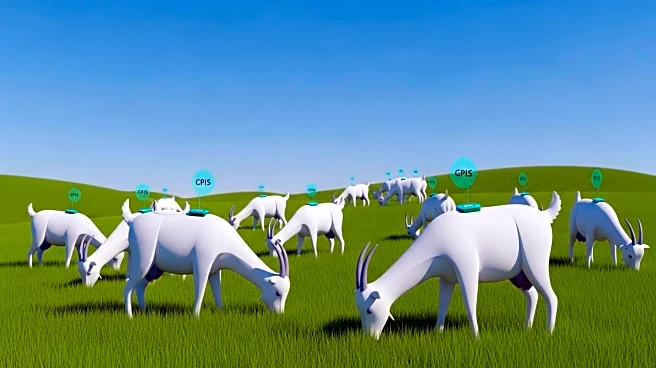What's Happening?
The Department of Agriculture in Cyprus is piloting a selective grazing program using GPS-tracked goats to mitigate wildfire risks in rural areas. This initiative follows a devastating wildfire in the semi-mountainous region of Limassol, which highlighted the need for innovative solutions to prevent future fires. The program aims to reduce flammable biomass accumulation by increasing grazing activity, which has decreased significantly in recent years. The pilot project is being conducted in the Pyrgos Tillirias zone, with plans to expand to additional areas in 2026. The goats' movements are tracked using GPS collars, and the impact of grazing on reducing combustible vegetation is measured through remote sensing techniques. The initiative is part of broader efforts to address challenges posed by climate change, including severe drought conditions affecting Cyprus's rural landscape.
Why It's Important?
This initiative is crucial for enhancing the environmental sustainability and resilience of Cyprus's rural areas, which are increasingly threatened by climate change-induced droughts and wildfires. By reducing the risk of fires through controlled grazing, the program supports the livelihoods of farmers and livestock breeders, who are vital to the local economy. The use of GPS technology in agriculture represents a forward-thinking approach to land management, potentially serving as a model for other regions facing similar challenges. The program also aligns with the objectives of the EU's Common Agricultural Policy, which seeks to support rural communities and tackle demographic ageing and high production costs. Successful implementation could lead to broader adoption of technology-driven solutions in agriculture, promoting sustainable practices and reducing environmental risks.
What's Next?
The pilot program will run until the end of 2026, with plans for expansion based on initial results. The Department of Agriculture will evaluate the data collected from GPS tracking and remote sensing to assess the program's effectiveness. If successful, the initiative may be included in Cyprus's new Strategic CAP Plan for the period beyond 2027. Additionally, the upcoming Cypriot Presidency of the Council of the EU in 2026 is expected to play a significant role in shaping discussions and negotiations related to rural sustainability. The Department of Agriculture is also considering additional actions to restore abandoned vineyard areas and improve water management, which are critical for maintaining the productivity of rural regions.
Beyond the Headlines
The use of GPS technology in agriculture not only addresses immediate environmental concerns but also represents a shift towards more data-driven and precision-based farming practices. This approach could lead to long-term changes in how rural areas are managed, potentially reducing the need for manual labor and increasing efficiency. Furthermore, the initiative highlights the importance of integrating technology into traditional sectors to enhance resilience against climate change. As rural areas face increasing pressures from urbanization and environmental degradation, innovative solutions like GPS-tracked grazing could play a pivotal role in preserving cultural heritage and social cohesion in these communities.










